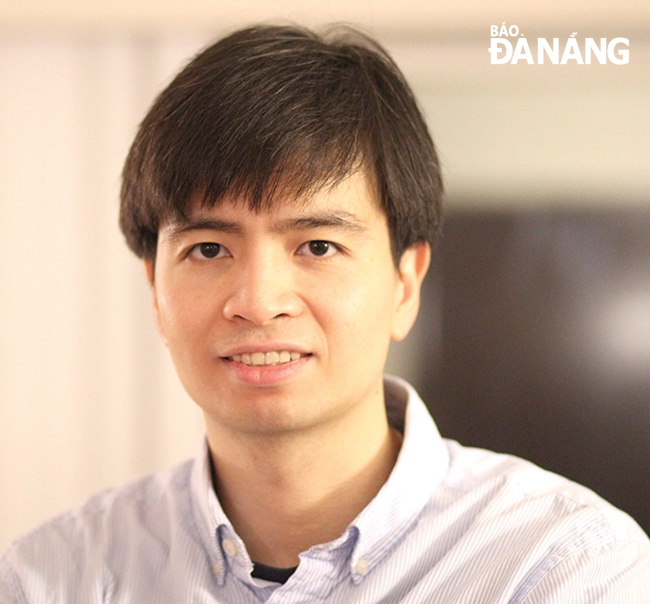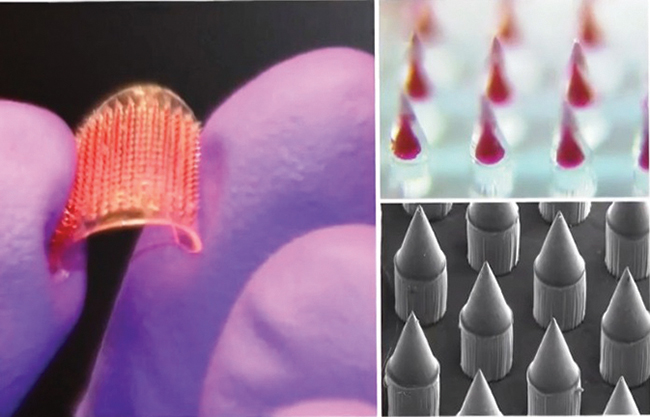"I always want to do something for sake of my hometown" said Da Nang-born professor in U.S.
It seems that in the heart of every intellectual, there is always a desire to make great contributions and do something highly beneficial for the community. As long as they have the opportunity to fulfill this wish at a certain time, they will definitely do it right away, with strong dedication and enthusiasm always in a state of readiness. Vietnamese Prof. PhD. Nguyen Duc Thanh, who now works in Mechanical and Biomedical Engineering at the U.S University of Connecticut (UCONN), is typical example of such a fact.
 |
| Born in 1984 in Da Nang, Prof. PhD. Thanh was a former student of Physics from the city’s Le Quy Don Senior High School for the Gifted from 1999 to 2002. |
Dream about biomedical technology faculty
Later December 2022, in line with his plan prepared for the past few years, Thanh, along with some colleagues at the U.S. University of Connecticut and other experts in the same field returned to Viet Nam to organise a seminar on biomedical technology at the Ha Noi University of Science and Technology where he graduated in engineering before going to the U.S.
This seminar was regarded as a first step for a long-term and ambitious plan initiated by Thanh and others with the same passion of building a model of training human resources in the field of biomedical technology in Viet Nam.
“Different from the field of information technology, biomedical technology is a field that requires great multidisciplinary skills. It is related to many fields such as physics, chemistry, materials, computers, biology and medicine. In addition to human resources, this field also needs a huge investment in machinery and equipment and a supporting industry to be able to commercialise the product after completing the research stage,” he said.
Also according to Thanh, if looking at the three "pillars" related to the development of the biomedical technology industry, which are human resources, machine infrastructure and supporting industries, with the strongly developing economy, Viet Nam can meet the requirements of the following two factors. But in terms of biomedical technology human resources, the most important pillar, it is necessary to build up a methodical and long-term investment and development strategy.
“In Viet Nam so far, according to my observation, there have been only a few training units in this industry, the number can only be counted on the fingers of one hand. However, when it comes to a well-trained, international-standard and large-scale training facility in biomedical technology, Viet Nam has yet to house it. As compared with other countries, Viet Nam's human resource level in this field is still very modest”, said Thanh. The aforementioned seminar in Ha Noi on biomedical technology aroused more interest from young people in this field.
 |
| A close up of microneedles on a vaccine patch developed by Prof. PhD. Thanh. Photo courtesy of Thanh.NVCC |
|
Passion for regenerative medicine As a concurrent professor of biomedical engineering and mechanical engineering at UCONN, Thanh has the opportunity to pursue his particular passion, which is also the area that ‘runs between’ these two specialties: the development of new medical devices and materials. Since the beginning of this year, he has founded 2 startups to raise capital for the commercialisation of already-completed products and have enough data to prove their safety and effectiveness. In detail, one focuses on developing an injection-free, single-use and self-administered microneedle vaccine patch. One patch is enough to produce the same immune effect as repeated injections over a long period of time. Development of this patch has great implications for the universalisation of global vaccines, especially people in remote areas who don't remember the repeat vaccination schedule, and where medical facilities are far away. The other develops biomaterials that can be used to make biodegradable N95 masks, and also artificial cartilage pads to help replace the patient's damaged joint cartilage without surgery, avoiding related side effects. In addition, his research lab is also pursuing an inspiring project to research materials (or devices) that emit ultrasound waves to help deliver therapeutic drugs to the brain, which has been a huge challenge for a long time treatment of diseases such as brain cancer. “Our brain has a very strong protective membrane that surrounds the brain so that nothing (except blood) can penetrate this membrane into the brain. This membrane provides maximum protection for the human brain against viruses, bacteria and toxins, but is a huge obstacle when it comes to bringing drugs into the brain for disease treatment. We’re working on a solution to that problem by inventing devices that can be implanted in the brain, emit ultrasound waves to induce a transient penetration of the drug through this membrane, and then self-destruct safely. Therefore, no invasive surgery is required to remove the device from the brain. Such a way avoids endangering this vital part of the human body. This project is being approved for publication on a major magazine and really makes its participants extremely excited”, said Thanh while talking about one of his labs focusing resources. |
Why now?
After 5 years of continuous efforts to research and maintain the vibrant activities of the laboratory with more than 11 members, overcoming the harsh requirements and challenges of each level in the American academic environment, the end of 2021, Thanh became a full-time professor at UCONN.
This marked really an important milestone in his career, giving him a reputation and a professional position that is influential enough to convince other colleagues to join professional projects after having built a network of leading experts in biomedical technology in the U.S. as well as other countries.
“I have always cherished the desire to establish a biomedical technology faculty in Viet Nam. After 5 years of research in this field, now is the time to start doing it,” revealed Thanh.
What is it like to be a professor in the U.S.? Research, sure, but not just that. Actually, a university professor in the U.S. is dubbed as the CEO of a business. In addition to professional academic work, professors here face the very harsh challenge of writing scientific project proposals in order to receive research funding for their labs from the government or from businesses.
No funding is periodically allocated, no funding falls from the sky, it is really a fair, if not fierce academic competition in the U.S. Therefore, it is not unreasonable that one of the most important criteria for evaluating the competence of professors in the U.S. is their ability to attract funding for their research projects. A professor receiving a lot of funding also means that their field of research is highly-valued and boasts off great application potential.
“In the early years, I had to write a lot of projects because the success rate was very low, sometimes only one or two out of the ten projects were approved. After each failure, I always looked back at the reasons for rejection to find ways to make adjustments, learn from experience for the next time, and do more experiments to get stub data, partial answers to certain questions and concerns of the project reviewers. Just like that, now my rejection rate has decreased much, I am assured that I have enough budget to maintain the lab with more than 11 members, including 3 Vietnamese ones and more soon, another one from Viet Nam”, said Thanh.
It should also be added, with the salary and support to do research for a doctoral student (Ph.D student) about USD 50,000 /year and a postdoctoral fellow (postdoc) nearly VND100,000 USD/year, plus other costs for machinery and research equipment, Thanh needs to maintain the current lab budget at least USD1 million-2 million/year.
| Many prestigious awards
Born in 1984 in Da Nang, Prof. PhD. Thanh was a former student of Physics from the city’s Le Quy Don Senior High School for the Gifted from 1999 to 2002. He graduated with a degree in engineering physics from the Ha Noi University of Science and Technology, then studied for a doctorate in mechanical engineering and aeronautical engineering at the U.S. Princeton University. After realising his special passion for biomedical technology, Thanh began doing his two-year postdoctoral research at the Massachusetts Institute of Technology (MIT). From 2016 until now, he has been a professor at the departments of Mechanical Engineering and Biomedical Engineering, and the Institute of Materials Science at the University of Connecticut. The strongly-willed, talented man has received many prestigious awards in the biomedical field including Outstanding young researcher for biomaterials as voted by Journal of Biomaterials in 2022, Outstanding young professor for regenerative medicine in 2020; Best innovator of Asia - Pacific recognised by MIT in 2019, Prominent young engineer in manufacturing and manufacturing as recognised by the American Association of Manufacturers in 2018; a prestigious award for young researchers from the U.S. National Institutes of Health in 2017. In particular, he used to be one of the 10 typical young Vietnamese faces in 2018. |
Reporting by DUONG KIM THOA - Translating by A.THU